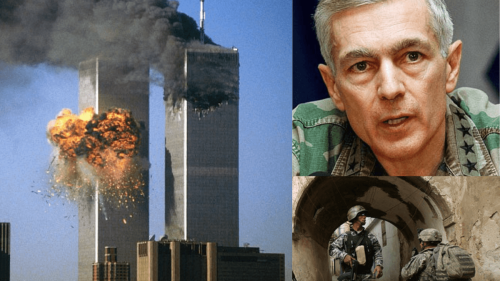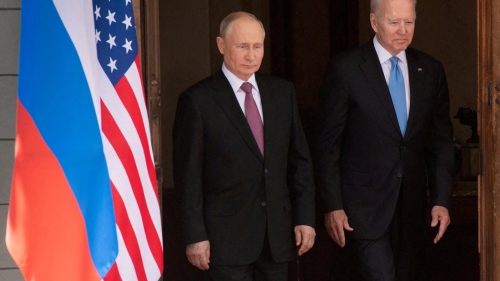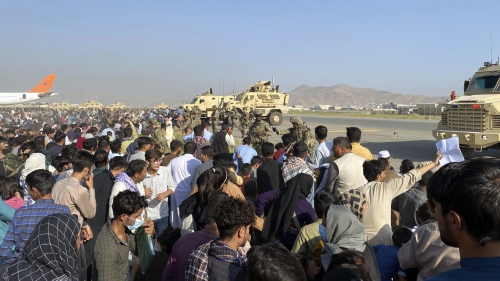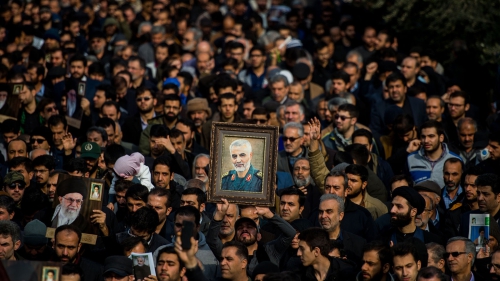The Capture of Saddam: Is it Really Over?
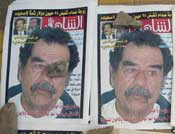 |
If the capture of former Iraqi President Saddam Hussein on December 13, by American forces, is of any contribution to the Iraq quagmire, it is a further inflection of an already augmented array of paradoxes.
Saddam remains a symbol of the vicious dictator, who brutally crushed any hint or suggestion of dissent. The survivors and the descendants of these victims are now dancing in the streets of Iraq, celebrating the end of an era, but they are hardly celebrating the dawning of a new one.
Indeed, Iraqis must find themselves caught up in their own web of contradictions; they aspired to end the reign of the disposed Iraqi regime, and now, they find themselves obligated to initiate a new fight, a much more arduous and grueling one.
Nothing sums up this grotesque contradiction that Iraqis experience like a giant banner with a boldly inscribed slogan: "No to Saddam, No to Occupation." Behind this banner marched thousands of Iraqis, only days after the fall of Baghdad last April. The banner communicated what was once assumed a transitory adjustment to concede to the new Iraq reality. Later, it exploded into full-fledged guerrilla warfare, and the end is nowhere in sight.
As if the incongruity was not absurd enough. Governments around the world, including countries whose records are dotted with every human rights violation conceivable, hailed the capture of Saddam as a victory for peace, justice and humanity as a whole. This includes countries with very real, not alleged weapons of mass destruction. It includes occupiers who have violated international law more times than one can count. The irony is unequalled.
In the center of the paradox however, resides President George W. Bush's government, uncontested. Running quickly out of pretexts for a war that has brought untold pain and suffering to the already starving Iraqis and to the families of American causalities, the capture of Saddam Hussein might offer a temporary sense of validation, a fleeting boost to the President's approval rating in the advent of an expectedly challenging presidential run.
"We just had no choice in Iraq. The country swims in oil," Deputy Defense Secretary Paul Wolfowitz told an Asian economic summit last June, words that still define the ill-advised and patently flawed Iraq war. Wolfowitz's words stand at odds with President Bush's response to the capture of the haggard looking Iraqi ruler: "A dark and painful era is over. A hopeful day has arrived."
But an equally dark era has also arrived, a fact omitted by the government's official declarations, yet well documented by internationally respected human rights groups, of whom Amnesty International and Human Rights Watch are the meager minority. The New York-based HRW said in a report released on December 12, that more than 1,000 Iraqi civilians were killed or wounded by the coalition's use of only one type of weapon, 13,000 cluster munitions, containing nearly two million sub-munitions. Even the capture of Saddam can hardly ease such a reality.
The dramatized Hollywood-like conclusion of the Saddam Hussein episode, aside from its infusion of the unavoidable paradoxes, will not be the winning card needed to quell the raging insurgency in Iraq. Sen. Jay Rockefeller, the vice chairman of the Senate Intelligence Committee was one of the very first to come to terms with this.
"Given the location and circumstances of his capture, it makes it clear that Saddam was not managing the insurgency, and that he had very little control or influences," according to Rockefeller. "That is significant and disturbing because it means the insurgents are not fighting for Saddam, they are fighting against the United States."
But will the capture of Saddam resolve any of these dilemmas? Will it inspire a case of collective self-reflection among rulers as brutal as the Iraqi leader was? Will it help Iraqis reconcile their differences and set forth a national agenda based on a future free of tyranny and oppression? Will it deprive the United States government of its last pretext to justify its occupation of Iraq or to explain the causes of the unavoidably authentic resistance? Will it bring an end to the war, the bloodshed?
It is not the apprehension of "a tired man" living in a dirt room underground that will matter; it is the future of a nation that finally climbed out of a hole, only to fall into a bottomless abyss. Who will define this future: the occupier or the occupied? At the end of the day, an honest answer to this seemingly effortless question is really all that matters.
Ramzy Baroud is a Palestinian-American journalist and editor-in-chief of The Palestine Chronicle online newspaper. His articles were published and quoted in newspapers around the world, including the Washington Post, the International Herald Tribune and the Guardian, among others. He is the editor of the anthology: "Searching Jenin: Eyewitness Accounts of the Israeli Invasion." Baroud is also a researcher for the Qatar-based al-Jazeera Net English.
To buy "Searching Jenin: Eyewitness Accounts of the Israeli Invasion" CLICK HERE









